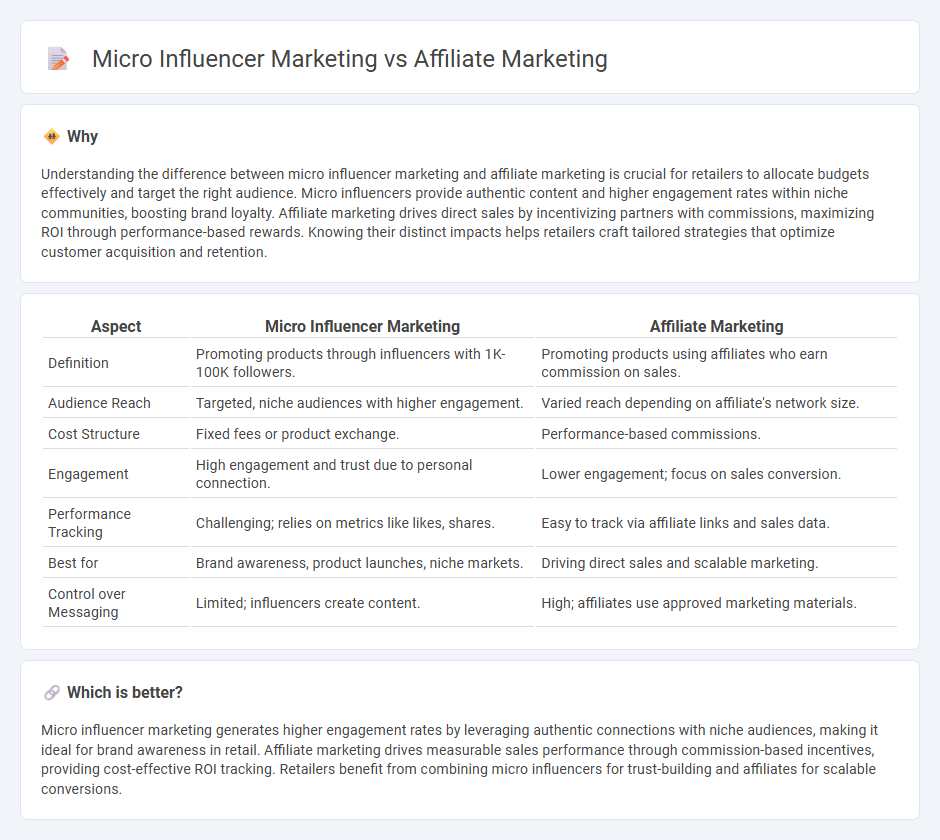
Retail brands leverage micro influencer marketing to engage niche audiences through authentic content and personalized recommendations, driving higher trust and conversion rates. Affiliate marketing focuses on performance-based partnerships, enabling retailers to expand their reach and track sales through commission-driven links. Discover which strategy aligns best with your retail goals and maximizes customer acquisition.
Why it is important
Understanding the difference between micro influencer marketing and affiliate marketing is crucial for retailers to allocate budgets effectively and target the right audience. Micro influencers provide authentic content and higher engagement rates within niche communities, boosting brand loyalty. Affiliate marketing drives direct sales by incentivizing partners with commissions, maximizing ROI through performance-based rewards. Knowing their distinct impacts helps retailers craft tailored strategies that optimize customer acquisition and retention.
Comparison Table
| Aspect | Micro Influencer Marketing | Affiliate Marketing |
|---|---|---|
| Definition | Promoting products through influencers with 1K-100K followers. | Promoting products using affiliates who earn commission on sales. |
| Audience Reach | Targeted, niche audiences with higher engagement. | Varied reach depending on affiliate's network size. |
| Cost Structure | Fixed fees or product exchange. | Performance-based commissions. |
| Engagement | High engagement and trust due to personal connection. | Lower engagement; focus on sales conversion. |
| Performance Tracking | Challenging; relies on metrics like likes, shares. | Easy to track via affiliate links and sales data. |
| Best for | Brand awareness, product launches, niche markets. | Driving direct sales and scalable marketing. |
| Control over Messaging | Limited; influencers create content. | High; affiliates use approved marketing materials. |
Which is better?
Micro influencer marketing generates higher engagement rates by leveraging authentic connections with niche audiences, making it ideal for brand awareness in retail. Affiliate marketing drives measurable sales performance through commission-based incentives, providing cost-effective ROI tracking. Retailers benefit from combining micro influencers for trust-building and affiliates for scalable conversions.
Connection
Micro influencer marketing leverages individuals with smaller, highly engaged audiences to promote retail products authentically. Affiliate marketing complements this by providing unique tracking links or codes, enabling micro influencers to earn commissions on sales generated through their content. This symbiotic relationship enhances brand trust and drives measurable revenue growth within the retail sector.
Key Terms
Commission structure
Affiliate marketing primarily operates on a performance-based commission structure where affiliates earn a percentage of sales generated through their unique referral links, often ranging from 5% to 30%, depending on the industry. Micro influencer marketing typically involves a fixed fee or hybrid model combining flat payments with bonuses tied to engagement or sales metrics, reflecting the influencer's smaller but highly engaged audience. Explore the nuances of commission structures to determine which model best suits your marketing goals.
Audience reach
Affiliate marketing leverages a wide network of partners to promote products, often resulting in extensive audience reach across diverse demographics. Micro influencer marketing targets niche communities with high engagement rates, providing more personalized and trusted recommendations within specific audience segments. Discover how aligning your marketing strategy with the right audience reach can maximize your brand's impact.
Content authenticity
Affiliate marketing leverages partner networks to promote products through trackable links, often prioritizing sales volume over content authenticity. Micro influencer marketing emphasizes genuine, relatable content created by individuals with niche, engaged audiences, enhancing trust and brand credibility. Explore how authentic storytelling in micro influencer campaigns drives higher consumer engagement and conversion rates.
Source and External Links
What Is Affiliate Marketing and How to Get Started - Coursera - Affiliate marketing is a digital marketing model where third-party affiliates promote a merchant's products or services and earn a commission based on sales or traffic generated, offering a low-cost marketing strategy for businesses and income opportunities for affiliates.
Affiliate Marketing 101: What it is and How to Get Started - BigCommerce - Affiliate marketing involves three key parties: sellers/product creators, affiliates who promote products, and consumers, with affiliates earning a share of the revenue by marketing products to a targeted audience.
Affiliate Marketing Guide: All You Need To Know (2025) - Shopify - Affiliate marketing is a performance-based strategy where affiliates earn commissions by driving sales or actions through unique affiliate links, with beginners encouraged to choose a niche, build an audience, and join relevant affiliate programs to start earning.
 dowidth.com
dowidth.com